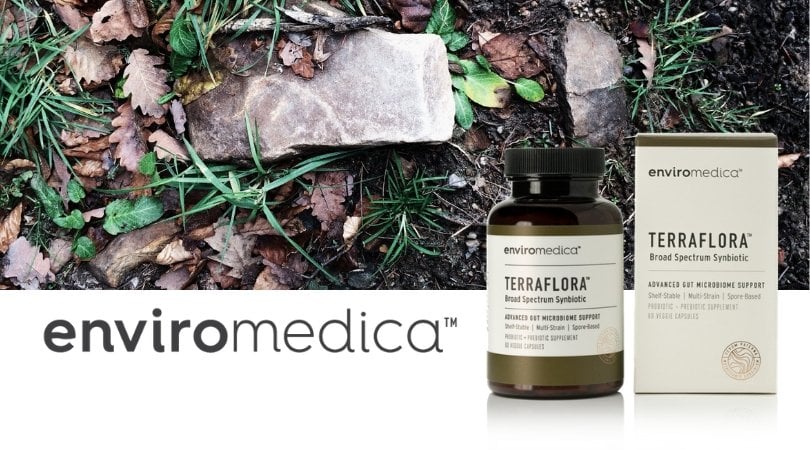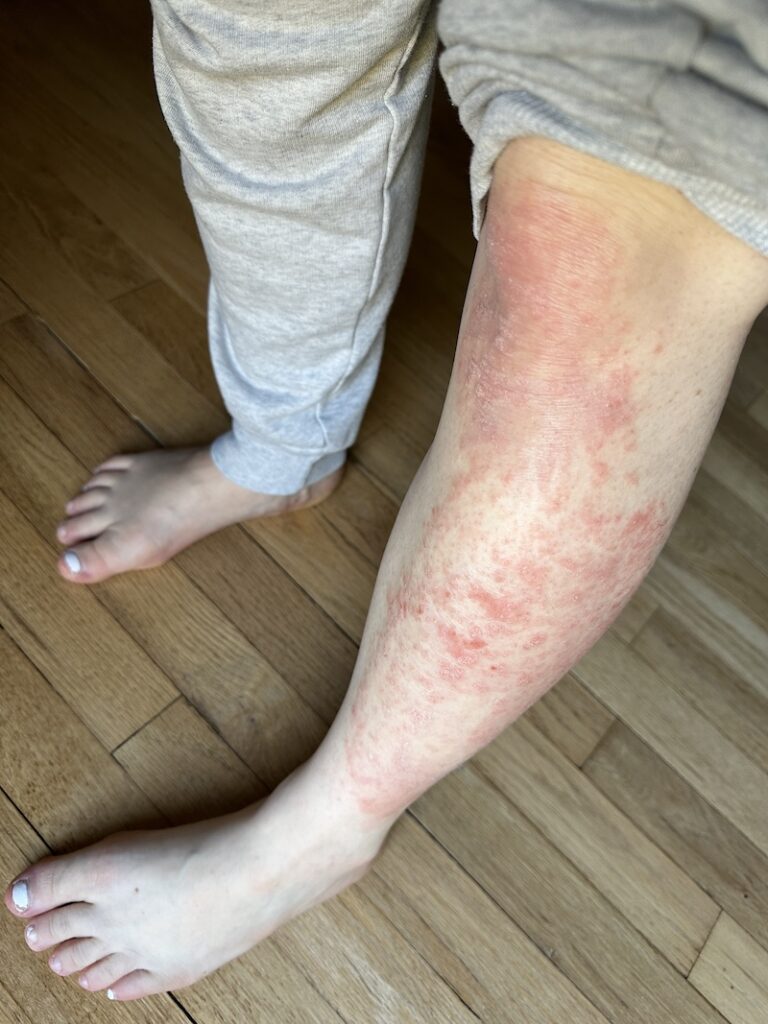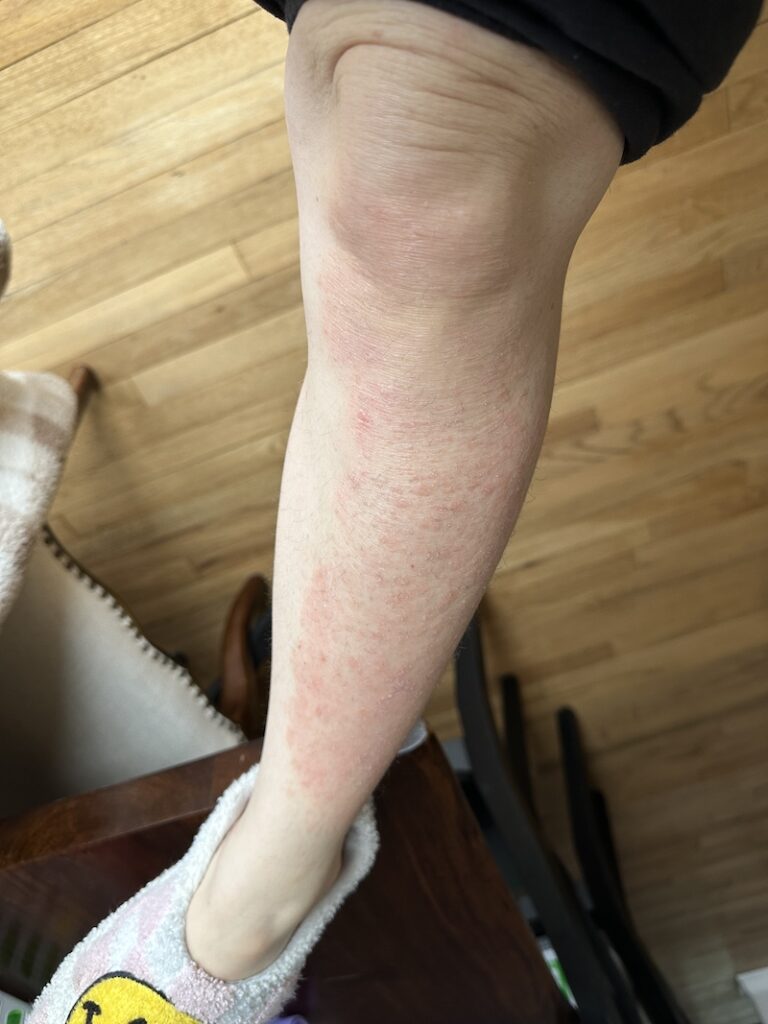/ Nov 05, 2025
Trending

A comprehensive, patient-centered approach to managing psoriasis by addressing root causes through homeopathy, gut health, and metabolic balance.
By Marisa Kassimir, ND
Psoriasis is more than just a skin condition—it is a visible sign of deep-seated systemic imbalances. For many, it is a lifelong struggle, with flares triggered by stress, diet, and immune dysfunction. Conventional treatments often provide temporary relief but fail to address the root causes. This case study highlights an integrative approach to managing severe psoriasis, incorporating homeopathy, nutrition, supplementation, and lifestyle interventions.
DL, a 38-year-old female, presented in August 2024 with a history of psoriasis since the age of 20. Her condition had significantly worsened in the 18 months before seeing me, following childbirth and the loss of her mother. The severity of her lesions and associated emotional distress had profoundly impacted her quality of life and activities of daily living.
DL exhibited widespread psoriatic plaques, with the most severe involvement on her anterior lower legs and scalp (notably the occiput). Additional lesions were present on her knees, thighs, arms, glutes, and vulva. The scalp lesions were thick and covered with silver scales, causing noticeable hair thinning. The lower leg lesions were erythematous with scales and scabbing, continuously spreading. All plaques were severely pruritic, and excessive scratching led to bleeding.
Psychosocially, DL experienced significant emotional distress. She avoided mirrors, wept multiple times per day, and expressed despair over finding relief. She feared medical treatments, supplements, and food, stating, “I can’t trust anything anymore.” She was anxious about her daughter developing psoriasis, particularly given her husband’s history of the condition. Although resistant to medical intervention, she was desperate for a solution.
Previous treatments tried:
Comprehensive laboratory analysis revealed multiple systemic imbalances:
These findings pointed to dysregulation of the hypothalamic-pituitary-adrenal (HPA), hypothalamic-pituitary-ovarian (HPO), and hypothalamic-pituitary-thyroid (HPT) axes, alongside insulin resistance and probable gut hyperpermeability.
Psoriasis is now understood as a condition that affects several different systems in the body, which is why a whole-body approach is key. Therefore, the treatment approach centered on reducing systemic inflammation, improving gut health and optimizing nutrient status, restoring hormonal balance, optimizing metabolic function, supporting detoxification pathways, and managing stress.
For example, problems with the gut barrier can contribute to inflammation and worsen psoriasis, making gut-healing strategies an important area to focus on.5 Additionally, metabolic health was a priority due to the link between insulin resistance and psoriasis.3 A systematic review from 2022 even found that mindfulness and meditation can help improve both the severity of the skin and the quality of life for people with psoriasis.4 There’s no strong evidence that vitamin D supplementation alone is a cure for psoriasis, but deficiency has been linked to autoimmunity. It plays an important role in immune function, making it a valuable addition to treatment.1
Given the complex, multi-system nature of psoriasis, it was clear that an integrative approach was necessary. Along with addressing factors above, I felt confident from the outset that homeopathy would complement these strategies effectively for this patient. In fact, research backs the use of homeopathy in treating psoriasis. A 2023 double-blind, randomized, placebo-controlled trial demonstrated that individualized homeopathic remedies significantly alleviated symptoms of psoriasis vulgaris, reinforcing homeopathy as a promising treatment for chronic skin conditions. In this study, the most commonly prescribed remedies included Calcarea carbonica, Mercurius solubilis, Arsenicum album, and Petroleum.2
The lesions were pathognomonic for psoriasis and not unique from a homeopathic perspective. However, the accompanying profound emotional distress, self-reproach, and overwhelming fear of medical interventions and food were highly distinctive.
After considering polycrest remedies for dermatologic conditions (Sulphur, Phosphorus, Arsenicum album, and Calcarea carbonica), Arsenicum album emerged as the most appropriate choice. Key confirmatory symptoms included: health-related anxiety, racing thoughts at night, emotional despair over healing.
Key Rubrics Used (Schroyens F. Synthesis Treasure Edition 2009V)
Prescription: Arsenicum album 30C, 2 pellets per day
At the first follow-up two months later, DL reported she had started the homeopathic remedy. She reported an initial two-week aggravation of symptoms, after which her itching and pain markedly improved. Although the plaques persisted, the emotional burden had lightened, and daily weeping had ceased.
At this visit, additional interventions were introduced:
At subsequent visits, further refinements included:
Over the next several months, DL’s psoriasis improved gradually, as shown in Table 1 and Figures 1 and 2. Her primary relief came from reduced pain and itching, greatly enhancing her quality of life. She reported progressive lesion regression, with patches becoming smaller, less hyperkeratotic, and less erythematous. A downward spread of lower leg lesions, commonly seen in healing processes, was noted.
At the five-month mark, her scalp lesions had fully resolved, with noticeable hair regrowth, confirmed by both her hairdresser and physical examination. Her mental health showed profound improvement—in office, she was notably less anxious and more optimistic. Her outlook on food shifted from avoidance to empowerment, focusing on resilience rather than restriction. This case is ongoing and we are carefully monitoring for any plateau or regression in symptoms that would indicate the need for an increase in homeopathic potency.
This case underscores the importance of a multi-factorial, individualized approach to psoriasis. While homeopathy appeared to be the catalyst for healing, addressing gut health, metabolic health, systemic inflammation, and stress management played equally critical roles. The resolution of DL’s most distressing symptoms illustrates the potential for integrative therapies in complex chronic conditions.
Her case signifies the importance of further research on the interplay between stress, metabolic health, and gut integrity on skin disorders, as well as the role of homeopathy as a modulator of systemic inflammation and immune balance.



Dr. Marisa Kassimir received her Doctor of Naturopathic Medicine (ND) from the Sonoran University of Health Sciences in Tempe, Arizona. Her clinical training primarily focused on the care and treatment of mental, pelvic, digestive, and hormonal health. She treats mainly with the modalities of homeopathic medicine, botanical medicine, mind-body medicine, nutrition, lifestyle, and natural supplementation. Dr. Kassimir has additional training in craniosacral therapy through the Upledger Institute. Prior to medical school, she received her Bachelor of Science in Biology and Genetics from the University of Georgia and received a certificate in permaculture design from Hava v’ Adam ecological farm in Israel.
A comprehensive, patient-centered approach to managing psoriasis by addressing root causes through homeopathy, gut health, and metabolic balance.
By Marisa Kassimir, ND
Psoriasis is more than just a skin condition—it is a visible sign of deep-seated systemic imbalances. For many, it is a lifelong struggle, with flares triggered by stress, diet, and immune dysfunction. Conventional treatments often provide temporary relief but fail to address the root causes. This case study highlights an integrative approach to managing severe psoriasis, incorporating homeopathy, nutrition, supplementation, and lifestyle interventions.
DL, a 38-year-old female, presented in August 2024 with a history of psoriasis since the age of 20. Her condition had significantly worsened in the 18 months before seeing me, following childbirth and the loss of her mother. The severity of her lesions and associated emotional distress had profoundly impacted her quality of life and activities of daily living.
DL exhibited widespread psoriatic plaques, with the most severe involvement on her anterior lower legs and scalp (notably the occiput). Additional lesions were present on her knees, thighs, arms, glutes, and vulva. The scalp lesions were thick and covered with silver scales, causing noticeable hair thinning. The lower leg lesions were erythematous with scales and scabbing, continuously spreading. All plaques were severely pruritic, and excessive scratching led to bleeding.
Psychosocially, DL experienced significant emotional distress. She avoided mirrors, wept multiple times per day, and expressed despair over finding relief. She feared medical treatments, supplements, and food, stating, “I can’t trust anything anymore.” She was anxious about her daughter developing psoriasis, particularly given her husband’s history of the condition. Although resistant to medical intervention, she was desperate for a solution.
Previous treatments tried:
Comprehensive laboratory analysis revealed multiple systemic imbalances:
These findings pointed to dysregulation of the hypothalamic-pituitary-adrenal (HPA), hypothalamic-pituitary-ovarian (HPO), and hypothalamic-pituitary-thyroid (HPT) axes, alongside insulin resistance and probable gut hyperpermeability.
Psoriasis is now understood as a condition that affects several different systems in the body, which is why a whole-body approach is key. Therefore, the treatment approach centered on reducing systemic inflammation, improving gut health and optimizing nutrient status, restoring hormonal balance, optimizing metabolic function, supporting detoxification pathways, and managing stress.
For example, problems with the gut barrier can contribute to inflammation and worsen psoriasis, making gut-healing strategies an important area to focus on.5 Additionally, metabolic health was a priority due to the link between insulin resistance and psoriasis.3 A systematic review from 2022 even found that mindfulness and meditation can help improve both the severity of the skin and the quality of life for people with psoriasis.4 There’s no strong evidence that vitamin D supplementation alone is a cure for psoriasis, but deficiency has been linked to autoimmunity. It plays an important role in immune function, making it a valuable addition to treatment.1
Given the complex, multi-system nature of psoriasis, it was clear that an integrative approach was necessary. Along with addressing factors above, I felt confident from the outset that homeopathy would complement these strategies effectively for this patient. In fact, research backs the use of homeopathy in treating psoriasis. A 2023 double-blind, randomized, placebo-controlled trial demonstrated that individualized homeopathic remedies significantly alleviated symptoms of psoriasis vulgaris, reinforcing homeopathy as a promising treatment for chronic skin conditions. In this study, the most commonly prescribed remedies included Calcarea carbonica, Mercurius solubilis, Arsenicum album, and Petroleum.2
The lesions were pathognomonic for psoriasis and not unique from a homeopathic perspective. However, the accompanying profound emotional distress, self-reproach, and overwhelming fear of medical interventions and food were highly distinctive.
After considering polycrest remedies for dermatologic conditions (Sulphur, Phosphorus, Arsenicum album, and Calcarea carbonica), Arsenicum album emerged as the most appropriate choice. Key confirmatory symptoms included: health-related anxiety, racing thoughts at night, emotional despair over healing.
Key Rubrics Used (Schroyens F. Synthesis Treasure Edition 2009V)
Prescription: Arsenicum album 30C, 2 pellets per day
At the first follow-up two months later, DL reported she had started the homeopathic remedy. She reported an initial two-week aggravation of symptoms, after which her itching and pain markedly improved. Although the plaques persisted, the emotional burden had lightened, and daily weeping had ceased.
At this visit, additional interventions were introduced:
At subsequent visits, further refinements included:
Over the next several months, DL’s psoriasis improved gradually, as shown in Table 1 and Figures 1 and 2. Her primary relief came from reduced pain and itching, greatly enhancing her quality of life. She reported progressive lesion regression, with patches becoming smaller, less hyperkeratotic, and less erythematous. A downward spread of lower leg lesions, commonly seen in healing processes, was noted.
At the five-month mark, her scalp lesions had fully resolved, with noticeable hair regrowth, confirmed by both her hairdresser and physical examination. Her mental health showed profound improvement—in office, she was notably less anxious and more optimistic. Her outlook on food shifted from avoidance to empowerment, focusing on resilience rather than restriction. This case is ongoing and we are carefully monitoring for any plateau or regression in symptoms that would indicate the need for an increase in homeopathic potency.
This case underscores the importance of a multi-factorial, individualized approach to psoriasis. While homeopathy appeared to be the catalyst for healing, addressing gut health, metabolic health, systemic inflammation, and stress management played equally critical roles. The resolution of DL’s most distressing symptoms illustrates the potential for integrative therapies in complex chronic conditions.
Her case signifies the importance of further research on the interplay between stress, metabolic health, and gut integrity on skin disorders, as well as the role of homeopathy as a modulator of systemic inflammation and immune balance.



Dr. Marisa Kassimir received her Doctor of Naturopathic Medicine (ND) from the Sonoran University of Health Sciences in Tempe, Arizona. Her clinical training primarily focused on the care and treatment of mental, pelvic, digestive, and hormonal health. She treats mainly with the modalities of homeopathic medicine, botanical medicine, mind-body medicine, nutrition, lifestyle, and natural supplementation. Dr. Kassimir has additional training in craniosacral therapy through the Upledger Institute. Prior to medical school, she received her Bachelor of Science in Biology and Genetics from the University of Georgia and received a certificate in permaculture design from Hava v’ Adam ecological farm in Israel.
It is a long established fact that a reader will be distracted by the readable content of a page when looking at its layout. The point of using Lorem Ipsum is that it has a more-or-less normal distribution of letters, as opposed to using ‘Content here, content here’, making it look like readable English. Many desktop publishing packages and web page editors now use Lorem Ipsum as their default model text, and a search for ‘lorem ipsum’ will uncover many web sites still in their infancy.
It is a long established fact that a reader will be distracted by the readable content of a page when looking at its layout. The point of using Lorem Ipsum is that it has a more-or-less normal distribution of letters, as opposed to using ‘Content here, content here’, making it look like readable English. Many desktop publishing packages and web page editors now use Lorem Ipsum as their default model text, and a search for ‘lorem ipsum’ will uncover many web sites still in their infancy.
The point of using Lorem Ipsum is that it has a more-or-less normal distribution of letters, as opposed to using ‘Content here, content here’, making

The point of using Lorem Ipsum is that it has a more-or-less normal distribution of letters, as opposed to using ‘Content here, content here’, making it look like readable English. Many desktop publishing packages and web page editors now use Lorem Ipsum as their default model text, and a search for ‘lorem ipsum’ will uncover many web sites still in their infancy.
It is a long established fact that a reader will be distracted by the readable content of a page when looking at its layout. The point of using Lorem Ipsum is that it has a more-or-less normal distribution
Copyright BlazeThemes. 2023